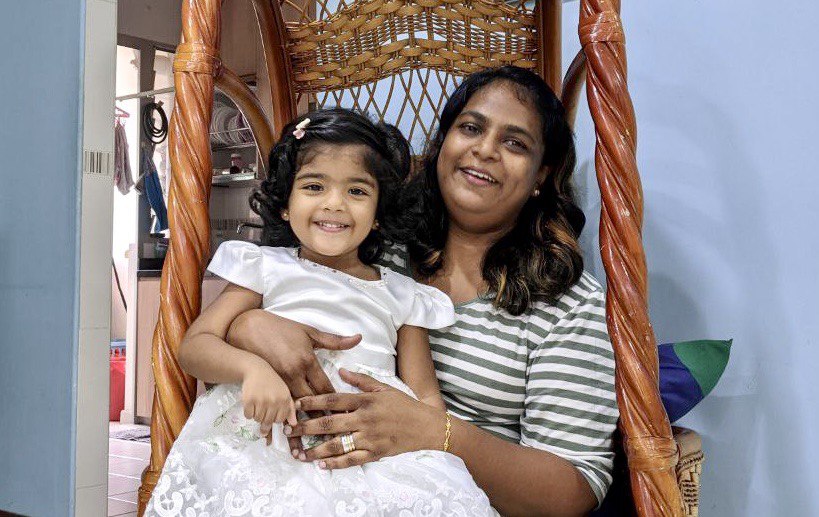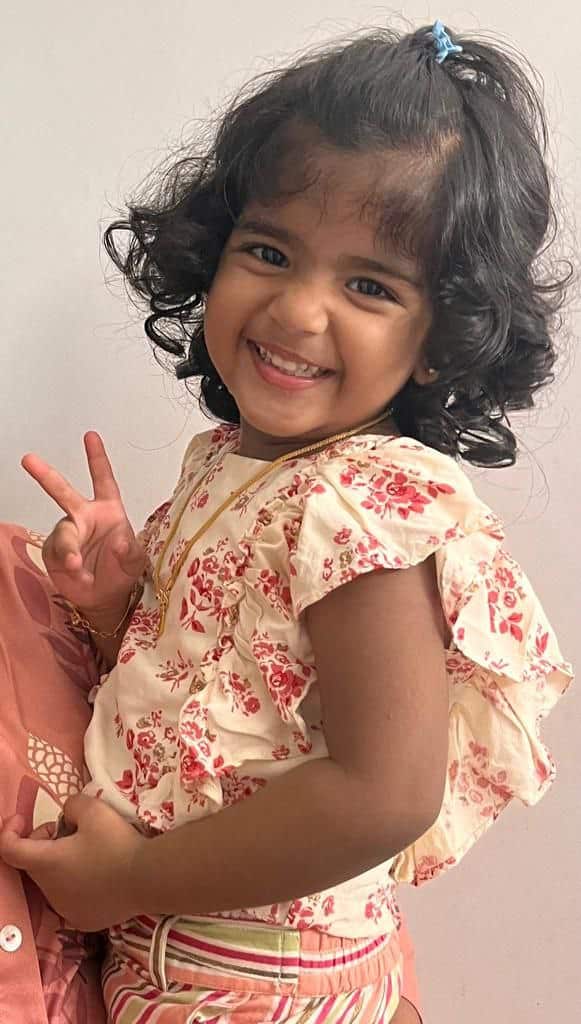“It was a miracle”: After 17 years of infertility and failed treatments, this mum had a child at age 45
by Gracia Lee // September 21, 2022, 10:00 pm

To K Mages Dorothy, little Joana is a living reminder of God's presence, faithfulness and goodness in her life. Photo by Gracia Lee.
Little Joana prances around the living room in a white dress, beaming cheekily as she strums an out-of-tune ukulele.
The two-and-a-half-year-old has just come home from playgroup and her mother, K Mages Dorothy, 47, is trying to get her to finish her lunch.
“Come here and have a scoop of rice. After you finish eating, you can watch TV,” the stay-at-home mum coaxes her only child, who continues to twirl about in the carefree way that toddlers do.
Mealtimes can be particularly frustrating at this stage, Mages says with a sigh familiar to most parents.
However, even amid the challenges of motherhood it is hard to complain, for her little one is a constant reminder of God’s goodness and graciousness in her life.
Joana, more precious to her than anything else in the world, is a gift Mages had waited for for 17 years.
Few options
When Mages tied the knot at 28, she never expected to have to walk the long and lonely journey of infertility.
Eager to be a mother, she and her husband had wasted no time in trying for a baby. But when a year passed without a positive pregnancy test, they sensed something was amiss.
“I was so desperate to have a baby. Anything you offered, I would try.”
Fertility treatments held out a candle of hope. They took a host of medication, followed by cycles of intrauterine insemination (IUI), a type of artificial insemination that injects sperm directly into the uterus, as well as an attempt at in-vitro fertilisation (IVF).
Each cycle only yielded disappointment.
They tried every possible option available to them, including treatments like fertility massages and traditional Indian medicine. Mages even went under the knife for a surgery, which she later found out was unnecessary and ineffective, to reposition her uterus.
“At the time I was so desperate to have a baby. Anything you offered, I would try. It was that kind of desperation, you know?” Mages told Salt&Light, adding that each attempt took a toll on her physical and mental well-being.
As the years passed, the couple’s options dwindled along with their hope of ever becoming parents. A deep sadness weighed on Mages’ heart.
Though she was doing well in her career as a staff nurse, life felt empty. “Everyday work, come back, there was nothing for me to look forward to at home,” she said.
Watching all her friends and relatives having babies one after another rubbed salt into her wounds. It came to a point that she could not bring herself to attend events, even family gatherings, that involved children.
“I didn’t like people to talk about babies or children in front of me. I felt like an outsider, like I couldn’t contribute to the conversation.”
Though she was hurting, she refused to let people into her struggle and would grow agitated whenever someone tried to comfort or encourage her. “Their pity reminded me that I was lacking something,” she said.
“Why me?”
A Christian since she was 12, Mages felt that God had forgotten her. The constant question she had as she railed at God was: “Why me?”
“I was very angry with God,” she admitted. “I was looking forward to God’s miracle. I really prayed, I really fasted, I had faith. But in the end the treatments were just a waste of money, a waste of effort.”
She stopped going to church and reading the Bible. Yet, at the end of each cycle of anger and disappointment, Mages found herself reaching out for God.
“In the end the treatments were just a waste of money, a waste of effort.”
“At the end of the day, I would still speak to Him. After all, He is my Heavenly Father. He is my provider. He has provided my food, my lodging, my everything. I can’t totally forget Him just because I don’t have a baby,” she acknowledged, adding that it was a fierce “battle of faith”.
Even though she knew that with each passing year her likelihood of conceiving was decreasing, the biblical story of Sarah, who had conceived at an old age even though she had been barren, remained at the back of her mind.
She believed that there was nothing impossible for God, and she believed that her time would come.
So, when she was 37, after a season of resting from medical treatment, she gathered up her courage and decided to have another shot at IVF. But then the all-too-familiar news of failure arrived.
She found herself in a place of utter surrender: “After that I told myself, ‘Don’t try anymore. If it is God’s will, God will give. If it’s not His will, you can’t force God to have a baby.'”
Flicker of hope
Mages stopped all fertility treatments for the next seven years, convinced that if God really purposed for her to conceive, she would be able to do so naturally. But if it was not His will, so be it.
Humanly-speaking, she had run out of hope. Yet at the back of her mind, there were whispers of a promise that her time would come.
In 2019, one of her cousins who was living in India urged her to go to Chennai for another round of IVF. By now Mages was 44 years old and knew that even with IVF, her chances of conceiving and bringing her baby to full-term was abysmal – less than five per cent.
“Looking at myself and the situation physically, I didn’t think it would be possible on my own, so I prayed about it for a long time,” she said, adding that she kept thinking about how God had gifted Sarah a son in her old age.
No probability or statistic could thwart what God had already purposed.
Feeling peace in her heart, Mages decided in faith to give it one final shot.
She flew to India with her husband and underwent the usual battery of procedures and hormonal injections to prepare her body for conception and pregnancy.
When the IVF transfer was completed, Mages felt just a flicker of hope come alive again in her heart. But she dared not fan its flame.
On the ninth day after the transfer, she started spotting – a possible sign of miscarriage. The bleeding continued over the next few days. “It’s over,” she thought to herself.
Doctors, however, were optimistic. They told her to wait until 14 days after the transfer before taking a pregnancy test to confirm if she had indeed miscarried or not.
Mages complied with the doctors, but “in my heart I had no hope already”, she recalled.
When she finally took the pregnancy test, however, she was shocked to see it come back positive. Two days later her hormone levels had doubled, confirming that she was really pregnant. At six weeks, doctors could see and hear the foetus’ heartbeat via an ultrasound examination.
Mages should have leapt for joy. But the years of vain hope had done a number on her emotions. Knowing that hers was a high-risk pregnancy with a high probability of complications due to her age, she dared not believe that the pregnancy would end in a child she could hold in her arms.
What she did not know then, was that no probability or statistic could thwart what God had already purposed.
A miracle
The next nine months were anxiety-filled.
When she flew back to Singapore, she started bleeding again. At a prenatal check-up, doctors could not find the baby’s heartbeat. Though it turned out to be a false alarm, the rest of her pregnancy would prove precarious.
The girl would be a living reminder to them of God’s presence, faithfulness and goodness in their lives.
There were a host of worrying issues, from bleeding and blood clots to gestational diabetes and high blood pressure.
As a result, Mages had to go for a prenatal appointment every two weeks so doctors could keep a close eye on her. Each appointment would bring about a measure of anxiety for Mages as she waited nervously to see and hear her baby’s heartbeat.
But through it all, Mages saw God’s hand of protection upon her and her unborn child.
For example, even though her diet was strictly restricted due to gestational diabetes, her baby continued to hit growth milestones during each check-up.
“It wasn’t by my own strength,” said Mages, who lost 8kg during her pregnancy due to her daily diet of only cucumbers, tomatoes and chicken. “It was a miracle. God was doing it all.”
On January 31, 2020, after she had carried her little one for 38 weeks, Mages gave birth via Caesarean section to a healthy child. “So beautifully made,” Mages thought as she first laid eyes on the girl.
The couple aptly named her Joana, which means “God is gracious”. The girl would be a living reminder to them in the years to come of God’s presence, faithfulness and goodness in their lives.
In His time
Back in the living room of Mages’ home, she shares that she regrets not allowing friends to speak God’s word into her life during her long wait for a child.
“The word of God is a light unto our path, so we must really read it to build up our faith in Him,” she said.

Cheeky and talkative, Joana has brought much joy to her parents. Photo courtesy of K Mages Dorothy.
In spite of having resisted godly encouragement, she had verses learnt in her younger years that stuck with her.
Beside the TV in their living room is a poster with one that she has now experienced firsthand. In fact, the verse is part of a song that her husband had sung to her on their wedding day, before they even knew about the arduous journey that awaited them.
It says: “He has made everything beautiful in His time.”
RELATED STORIES:
Don’t say “I know how you feel”: Here’s how to be really present for someone who is grieving
We are an independent, non-profit organisation that relies on the generosity of our readers, such as yourself, to continue serving the kingdom. Every dollar donated goes directly back into our editorial coverage.
Would you consider partnering with us in our kingdom work by supporting us financially, either as a one-off donation, or a recurring pledge?
Support Salt&Light



